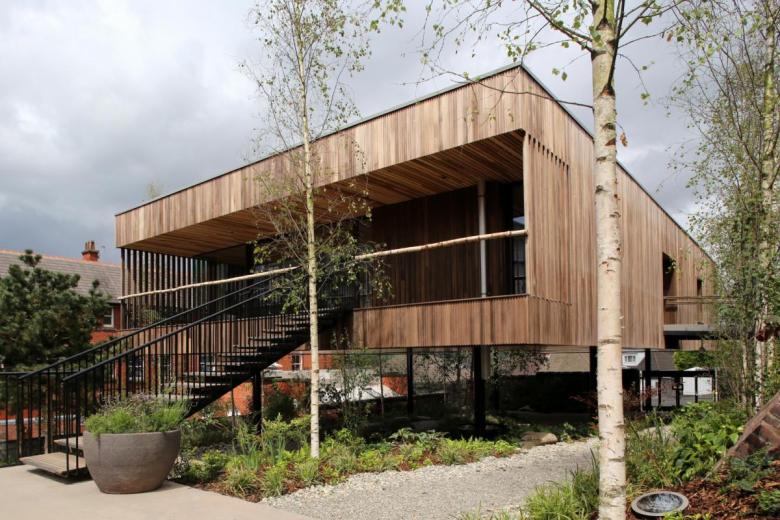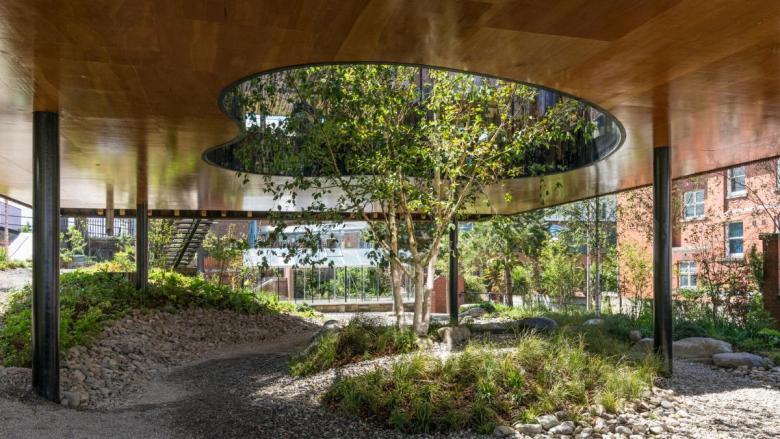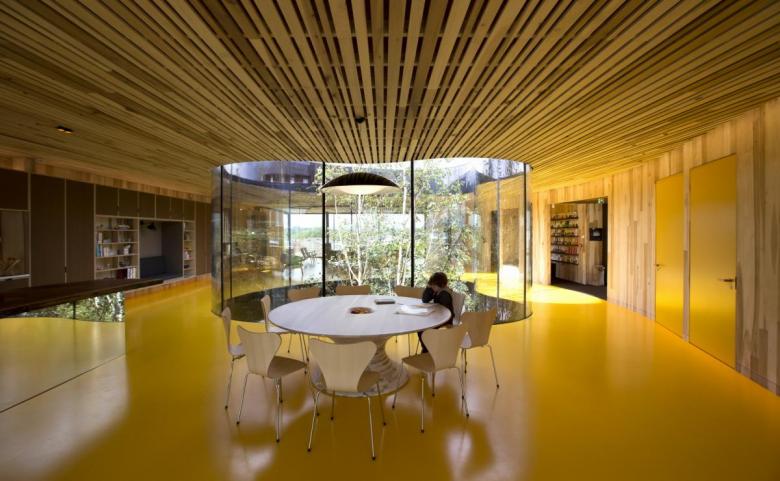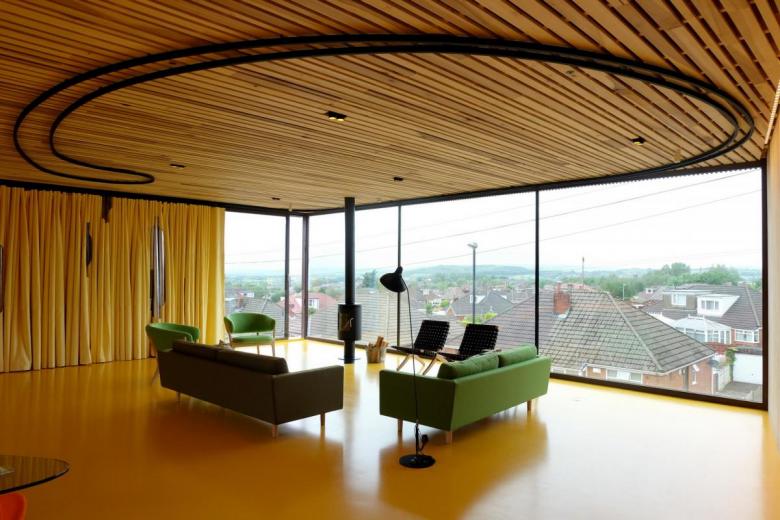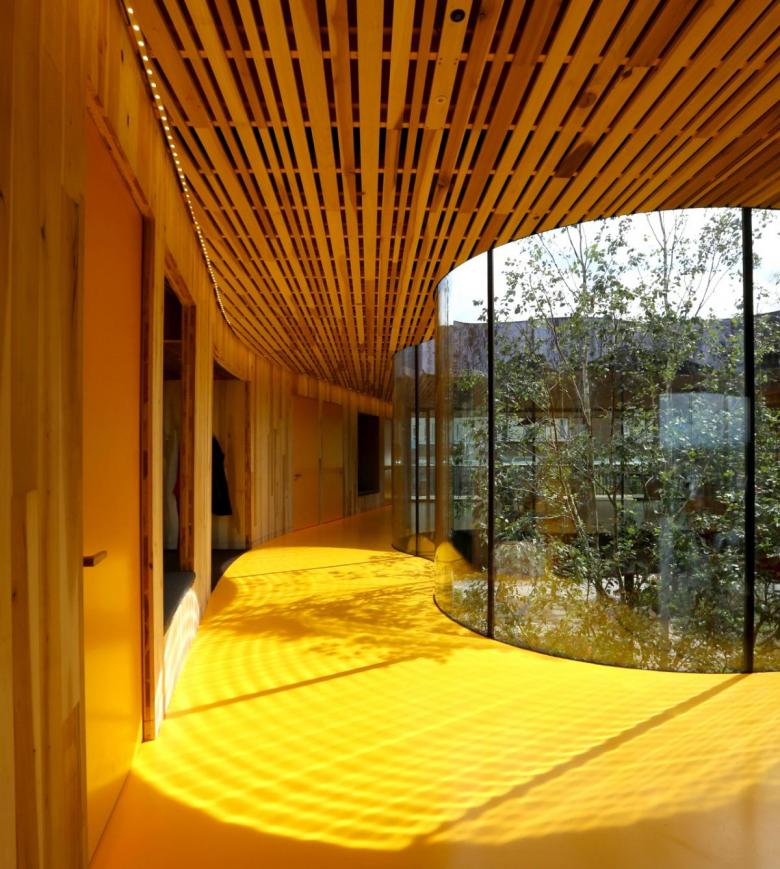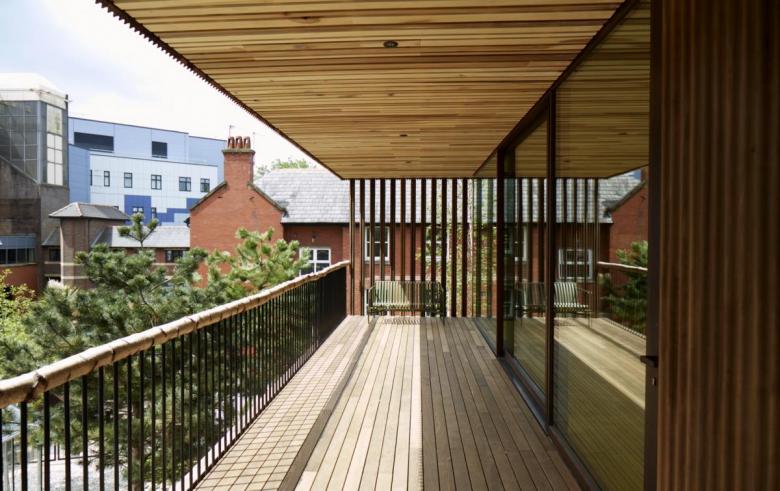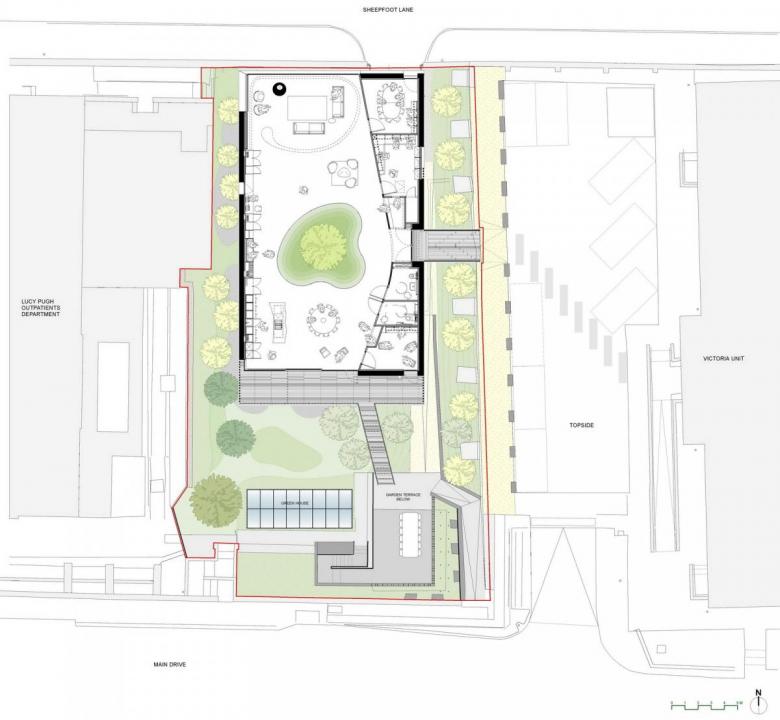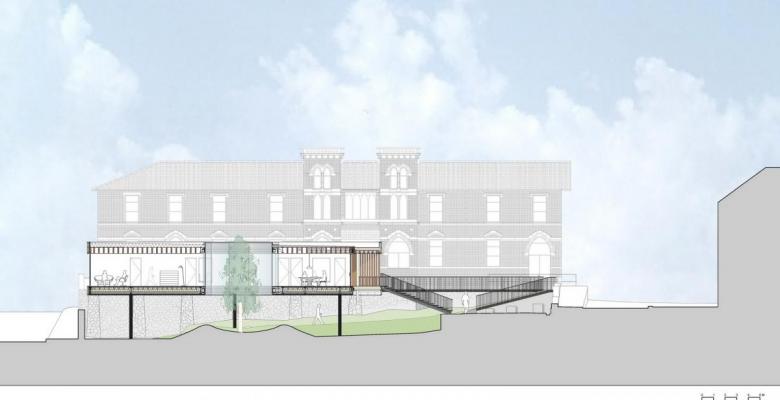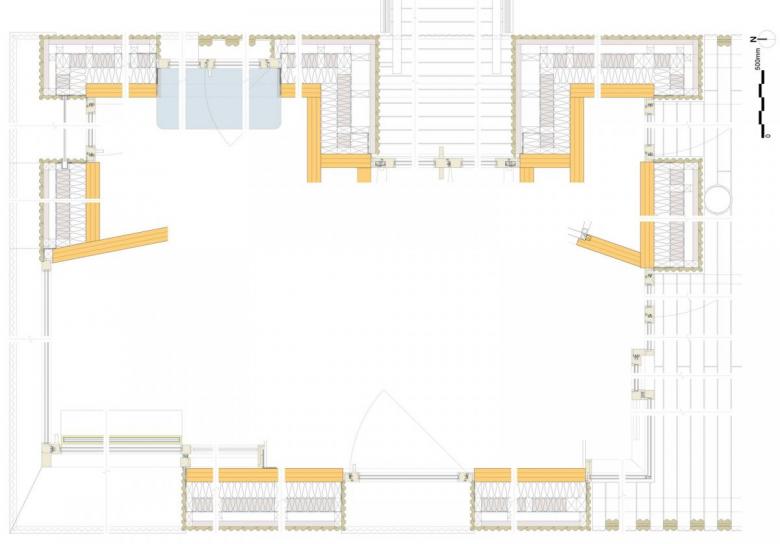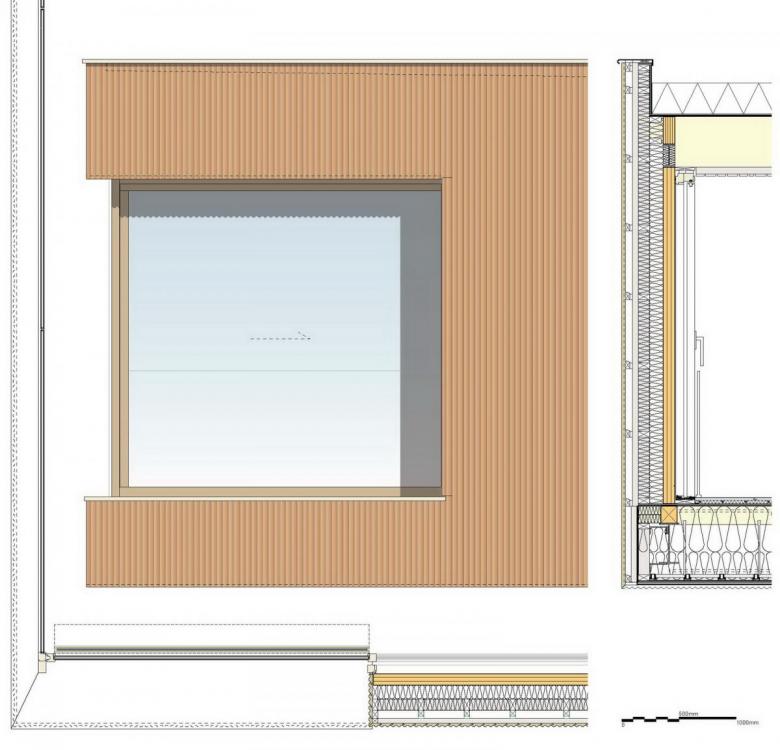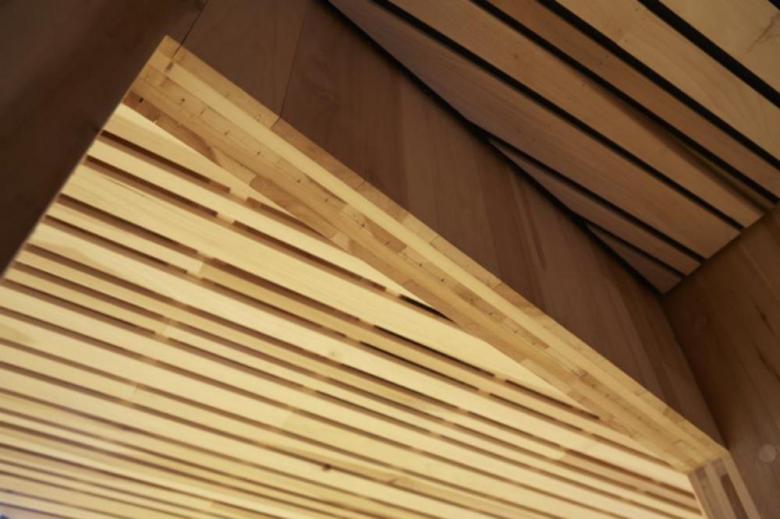Healing with Tulipwood
John Hill, Thomas Geuder
18. september 2017
The 21st Maggie's Centre, designed by London's dRMM, was built in Oldham near Manchester. (Photo: Alex de Rijke / AHEC)
In Oldham, England, Maggie's recently realized another one of its helpful and inspiring cancer centers. With a growing awareness of wood's soothing effect on people, dRMM designed a building with restorative spaces full of American Tulipwood.
Project: Maggie's Oldham, England, 2017
Client: Maggie's, Edinburgh, UK
Architect: dRMM, London
Sponsor: AHEC - American Hardwood Export Council, Sterling, USA / London
Contractor: Züblin Timber, Aichach, Germany
Supplier Tulipwood CLT elements: Middle Tennessee Lumber, Burns, US
Development facade profiles: dRMM
Processing facade profiles: Morgan Timber, Rochester, England
Supplier tulipwood facade profiles: Northland Forest Products, Kingston, US
dRMM describes the design as a "matchbox on stilts, with a hole through the middle, like a cored apple." (Image: Tony Barwell / AHEC)
Maggie's Centres are very well known in Great Britain. In them, people with cancer, as well as their families and friends, are offered free practical and emotional support. The Maggie's Centres' new type of cancer therapy was conceived by Maggie Keswick Jencks (1941-95). She was multi-talented, having served as an author, artist and garden designer, worked in the fashion industry, and studied at the Architectural Association in London. In 1978 she published The Chinese Garden: History, Art and Architecture, the same year she married architecture critic Charles Jencks. Keswick, who was diagnosed with cancer in 1993, envisioned the Centres as warm, welcoming places with qualified staff, not infrequently designed by internationally renowned architects such as Zaha Hadid, Thomas Heatherwick, and Steven Holl.
Earlier this year, 22 years after Maggie's was founded, the 21st Maggie's Center opened, in Oldham near Manchester. The new building was designed by London's dRMM, an architecture firm that has made great strides in the use of sustainable hardwood. dRMM has a playful side as well, as was evidenced in the Endless Stair, which was built in 2013 in front of the Tate Modern as part of the London Design Festival. Working with the engineers from Arup, the prefabricated wooden installation was designed to carry 100 people at once. This Escher-like, "endless staircase" also served as a test run in the handling and construction of Tulipwood CLT (Cross Laminated Timber), which was also used in the Maggie's building.
Nature is always present in the interior and is carried through with the materials. (Photo: Alex de Rijke / AHEC)
Maggie's Oldham is built on the grounds of the Royal Oldham Hospital, a complex of several smaller and larger buildings. Round steel supports, up to four meters high, support the one-story building, in order to address the site's level changes and give the whole a certain lightness. At the same time, the ground is preserved for a garden that can be freely used. The themes of nature and the garden are found throughou, not only on the outside. Openings in the floor and roof allow a tree to pass through the building, presenting it as a sculpture.
The living room area, with its view of the distant Pennines, can be cordoned off from the other spaces by a curtain. (Picture: Jasmin Sohi / AHEC)
The tree in the center of the plan is not the only connection to nature. The atmosphere in the building is mainly determined by a single material: American Tulipwood, which the architects chose because of its strength and warm character. "From the Oldham project inception we knew it was the right material for Maggie’s, not only structurally and visually, but conceptually," says Alex de Rijke, co-founder and director at dRMM. "An elevated, open plan, all-timber and glass building – with trees growing through it, and every detail considered from the perspective of use, health, and delight – was always going to be special." Tulipwood is a relatively fast growing wood which is lightweight yet very strong compared to normal hardwood.
The curved inner wall separates the smaller group rooms and bathrooms from the main space. (Photo: Alex de Rijke / AHEC)
Maggie's Oldham is made with 27.6 cubic meters of American Tulipwood and 1.1 cubic meters of Ash. These woods were made into twenty prefabricated elements of five-layered plywood CLT with lengths between 0.5 and 12 meters, a thickness of 10cm, and a height of 2.93m. The exterior woods on the facade and balcony were thermally treated: dried at 200°C without oxygen to increase the dimensional stability and durability. Inside, the wood reportedly creates an ambiance that lowers the blood pressure and the pulse and thus the recovery time. According to the 2015 report Wood Housing, Health, Humanity from Planet Ark, wood has a greater benefit to health and well-being than any other building material.
The bright, colorful resin floor and the double-sided velour and leather curtain by Dutch designer Petra Blaisse also contribute to the positive atmosphere. An element central to Maggie's culture is a meeting place, a kitchen table where staff and visitors can sit and talk over tea. Usually rectangular, the kitchen table in Oldham is round, based on a 2014 "Wish List" table designed by Alex de Rijke and built by craftsmen Rob Barnby and Lewis Day for AHEC as part of the 2014 London Design Festival. The Wish List twin that is now an anchor inside Maggie's Oldham is supported, fittingly, by recycled CLT sections that were cut outs from the new building's doors – beautiful but also sustainable.
The balcony at the southern end of the building has a wooden floor made of ash. (Photo: Jon Cardwell / dRMM)
Floor plan with site (Drawing: dRMM)
Building section (Drawing: dRMM)
Perimeter plan details (Drawing: dRMM)
Corner window elevation, section, and plan detail (Drawing: dRMM)
The American Tulipwood wall elements are prefabricated as CLT (Cross Laminated Timber). (Photo: Jon Cardwell / AHEC)
A version of this article originally appeared as "Holzige Atmosphäre" on German-Architects.
Gerelateerde artikelen
-
Healing with Tulipwood
on 18-09-2017
